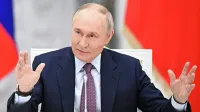Why China is fleecing Russia dry
global.espreso.tv
Mon, 10 Nov 2025 14:18:00 +0200

Putin is probably convinced that he won't blink first, but he's deluding himself. And it might turn out that he won't be replaying the Cuban Missile Crisis, but a much less known, yet very real one, that could have destroyed the entire planet."It's a paradox, but Moscow planned to drop a nuclear bomb on the very country without which it would have lost the war in Ukraine back in 2022. On Beijing."And another paradox is that the one who forbade Moscow from doing it was the one who wouldn't mind dropping a bomb on Beijing now – Washington. The Chinese nuclear crisis was a continuation of the conflict on Damansky Island.Overall, it's a lovely thing: watching communist dictators quarrel. You'd have to search far and wide for such hysterics; not every mother-in-law and daughter-in-law can do it so well.Tito and Stalin.Khrushchev/Brezhnev and Mao.Before the conflict over Damansky Island began, the USSR amassed 44 divisions there. One and a half million people. But even before that, it tried to economically cripple the PRC, which was totally dependent on the USSR.At one point, 1,390 technicians, scientists, and engineers were recalled.It was a disaster: 250 important facilities remained unfinished."But the real betrayal in Mao's eyes was the refusal to transfer nuclear bomb technology to the Chinese. And Beijing remembered that very well. That's why in our war, it's fleecing Russia dry, but not giving it technology."The key moment – after dozens were killed on Damansky – was Moscow's decision to use nuclear weapons against Beijing. Before that, they sounded out the U.S. The Americans said a categorical "no" – incidentally, just as the Chinese said "no" to Moscow's intentions to bomb Kyiv with nukes.The White House did this for two reasons:China was just making its famous Kissingerian reversal – moving closer to the U.S., gaining the legitimate Republic of China's (Taiwan's) seat in the UN. The peak of this cooperation was China's support for anti-Soviet rebels in the Afghan war.The U.S. has an iron doctrine – only they have used the nuclear bomb, and this monopoly must be preserved forever.Of course, if it had been Stalin's USSR, they wouldn't have cared about the U.S.'s opinion.But it was Brezhnev's USSR – a country that, to avoid starving to death, bought American and Canadian grain and had just learned to use toilet paper.And this story teaches us only one thing, which was long ago said by a representative of the nation that, after Rome, was the best global manager.The 19th Prime Minister of Great Britain, Lord Palmerston: "Ukraine has no eternal allies and no eternal enemies. Ukraine has only eternal interests." Or something close to that, but he definitely said it.* Published preserving the author's styleSourceAbout the author: Oleh Manchura, journalist.The editorial board does not always share the opinions expressed by blog authors.








